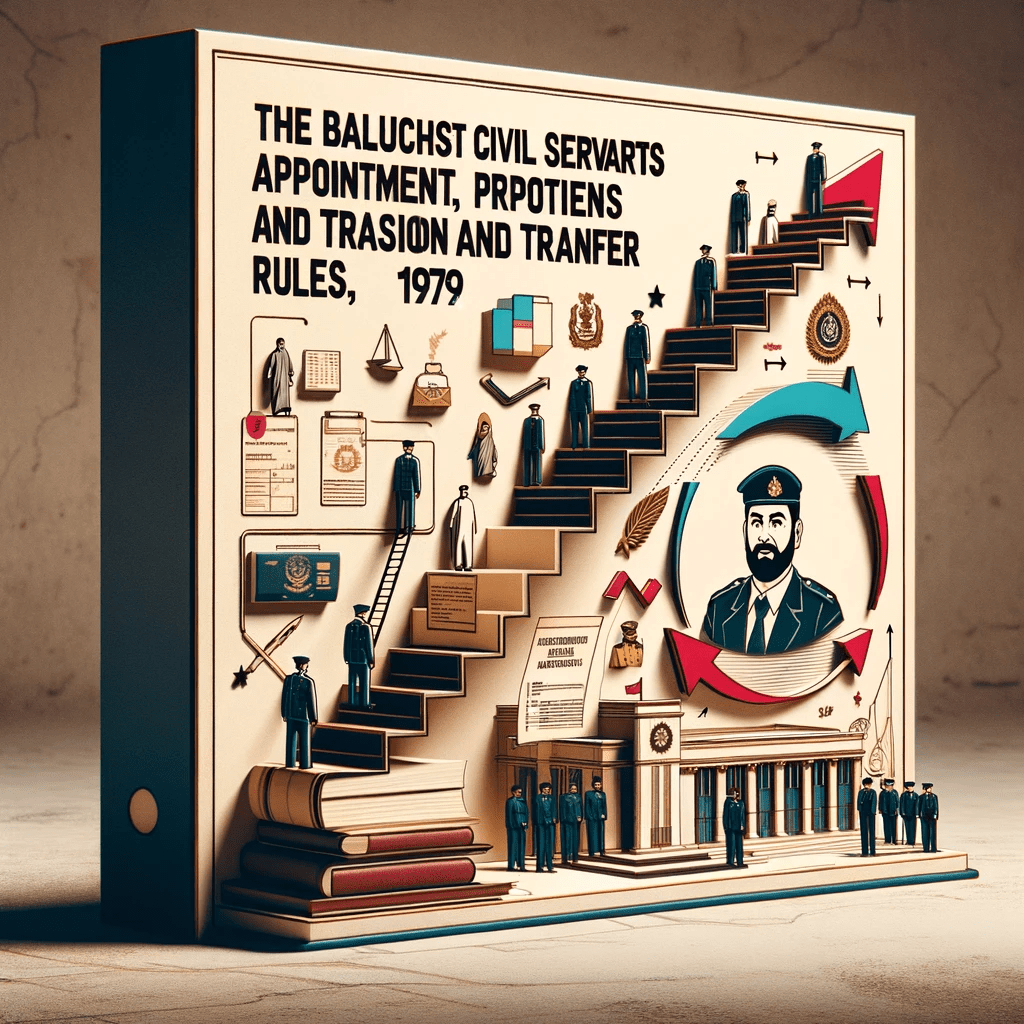THE Baluchistan Civil Servants (Appointment, Promotion And Transfer) Rules, 1979
THE Baluchistan Civil Servants (Appointment, Promotion And Transfer) Rules, 1979 The Baluchistan Civil Servants (Appointment, Promotion, and Transfer) Rules, 1979, constitute a crucial set of regulations that govern the processes of appointment, promotion, and transfer of civil servants in the province of Baluchistan, Pakistan. These rules, established in 1979, provide a structured framework for the recruitment, career advancement, and transfer of government employees. In this introduction, we will delve into the historical context, key objectives, and legal significance of these rules. Part Contents Part I General Part II Appointment By Promotion Or Transfer Part III Initial Appointment Part IV Ad Hoc And Temporary Appointments THE Baluchistan Civil Servants (Appointment, Promotion And Transfer) Rules, 1979 In exercise of the powers conferred by subsection (1) of section 25 of the Baluchistan Civil Servants Act, 1974 (Baluchistan Act No. IX of 1974), the Government of Baluchistan is pleased to make the following rules:- Part I – General These rules may be called the Baluchistan Civil Servants (Appointment, Promotion and Transfer) Rules, 1979. In these rules, unless there is anything repugnant in the subject or context,– (a) ‘appointing authority’, in relation to a post, means the person authorized under rule 6 to make appointment to that post; (b) ‘Provincial Selection Board’ means the Board constituted by Government for the purpose of selection for promotion or transfer to posts in [basic pay scales (17) and above and equivalent] and consisting of such persons as may be appointed to it by the Government from time to time; (C) ‘Commission’ means the Baluchistan Public Service Commission; (d) ‘Departmental Promotion Committee’ means a Committee constituted for the purpose of making selection or promotion or transfer to posts under Department or Office of Government in [basic pay scales 16 and below and equivalent]; (e) ‘Departmental Selection Committee’ means a Committee constituted for the purpose of making selection for initial appointment to posts under Department or Office of Government in [basic pay scales 16 and below and equivalent]; (f) ‘Government’ means the Government of Baluchistan; -(1) Appointments to posts shall be made by any of these methods, namely:- (a) by promotion or transfer in accordance with Part II of these rules; and (b) by initial appointment in accordance with Part III of these rules (2) the method of appointment and the qualifications and other conditions applicable to a post shall be as laid down by the Department concerned in consultation with the Services and General Administration Department. The authorities competent to make appointments to the various posts shall be as follows:- Posts Appointing Authority 1. Posts in basic pay scale 17 and above Government 2. Post in basic pay scale 16 (1) Chief Secretary (for Secretariat) (2) Administrative Secretary (for attached Departments) 3. Posts in basic pay scale 3 to 15 (1) Secretary, S&GAD for (Secretariat) (2) (i) Secretary of the Department; or (ii) Head of an attached Department. 4 Posts basic pay scales 1 and 2 Deputy Secretary or Head of an attached Department or Head of office 5.-(1) In each Department or Office of Government, there shall be one or more Departmental Promotion Committees and Departmental Selection Committees, the composition of which shall be determined by the Department concerned in consultation with the Services and General Administration Department. (2) Each such’ Committee shall consist of at least three members one of whom shall be appointed as Chairman. Where an appointing authority for [posts in basic pay scales 15 and below and equivalent] does not accept the recommendation of the appropriate Departmental Promotion Committee, it shall record reasons therefore and obtain orders of the next higher authority. Part II -Appointment By Promotion Or Transfer Promotions and transfers to posts in basic pay scales 2 to 16 and equivalent shall be made on the recommendations of the appropriate Departmental Promotion Committee and promotions and transfers to posts in basic pay scale 17 and above and equivalent shall be made on the recommendations of the Provincial Selection Board. 7-A. All transfers in BPS-18 and below in the Attached Departments and Subordinate Offices shall be made by Minister In charge except in cases of S & GAD and Police Department in which cases the respective Ministers will be consulted. Persons as possess ‘such’ qualifications and fulfill the conditions laid down for the purpose of promotion or transfer to a post shall be considered by the Departmental Promotion Committee or the Provincial Selection Board, as the case may be. Appointments by transfer shall be made from amongst the persons holding appointment on regular basis in [posts in same basic pay scale or equivalent to or identical with] the post to be filled in . Part III-Initial Appointment Initial appointments to posts in [basic pay scales 1 to 15 and equivalent] shall be made if the posts’ (a) fall within the purview of the Commission, on the basis of examination or test to be conducted by the Commission; (b) do not fall within the purview of the Commission, in the manner as may be determined by Government. 11. Initial appointments to posts in [basic pay scales 1 to 15 and equivalent] shall be made on the recommendations of the Departmental Selection Committee after the vacancies in [posts in basic pay scales 3 to 15 and equivalent] have been advertised in newspapers. A candidate for initial appointment to a post possess the educational qualifications and experience and, except as provided in the rules framed for the purpose of relaxation of age limit, must be within the age limits as laid down for the post. A candidate for appointment shall be citizen of Pakistan and a domicile of the Province of Baluchistan: Provided that this requirement may be relaxed with the approval of the Service and General Administration Department. Vacancies in the under-mentioned posts shall be filled on Provincial basis with the merit and regional or District quota as determined by Government from time to time. (i) Posts in [basic pay scale
THE Baluchistan Civil Servants (Appointment, Promotion And Transfer) Rules, 1979 Read More »
Laws of Pakistan - Library


